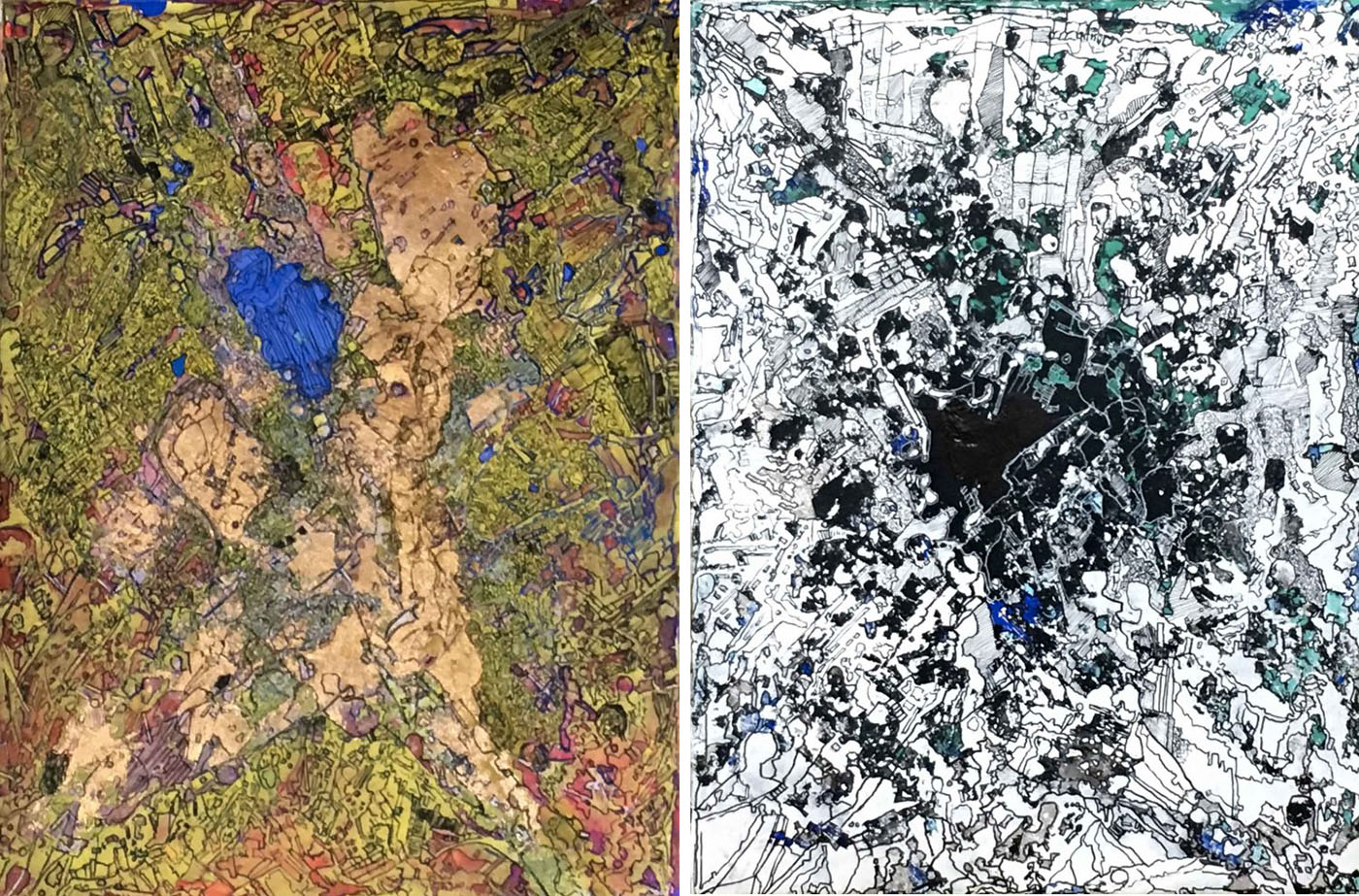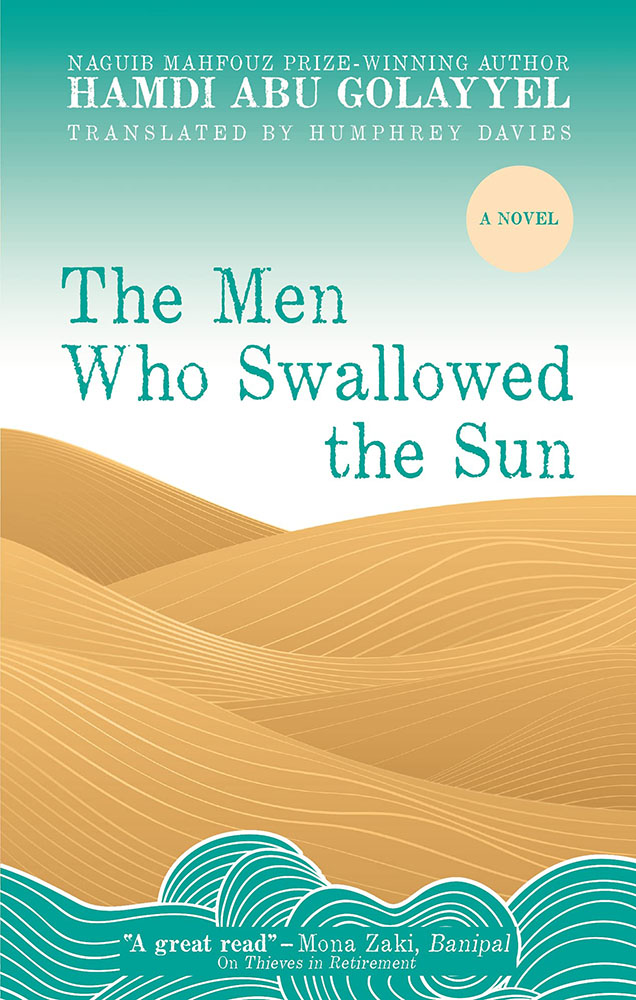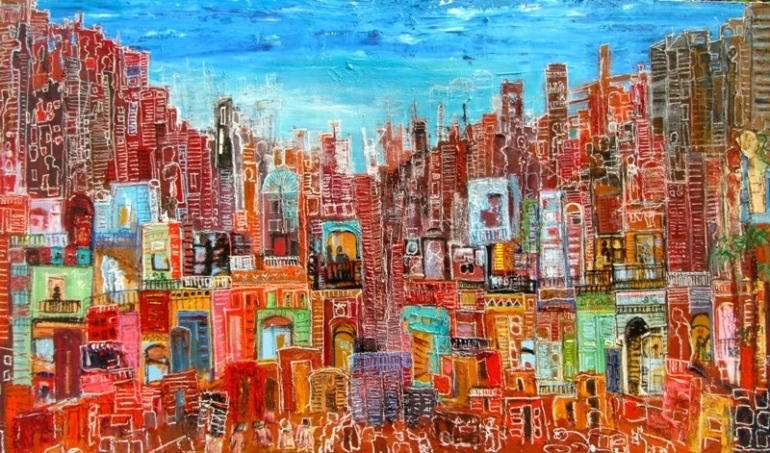
The Men Who Swallowed the Sun, a novel by Hamdi Abu Golayyel
Translated from the Arabic by Humphrey Davies
Hoopoe Press (2022)
ISBN 9781649030948
Saliha Haddad
While the modern world has known refugee crises of epic proportions at least since the two world wars, we have seen a plethora of novels about migration and exile written by Arab authors, from Ghassan Kanafani’s seminal Men in the Sun to the more recent crop that includes Omar El Akkad’s What Strange Paradise, Layla AlAmmar’s Silence is a Sense, and Rabih Alammedine’s The Wrong End of the Telescope. Hamdi Abu Golayyel’s The Men Who Swallowed the Sun, originally published in Arabic in 2018 as Qiyam wa inhiyar al-sad shin, should be considered in this vein.

Born in the late sixties in a small Bedouin village in Egypt’s Fayoum region, Hamdi Abu Golayyel migrated to Cairo in the early eighties, where for years he worked in construction, doing hard manual labor, only later launching his writing career. Before long, however, Golayyel’s creative pursuit and dedication began to earn him literary acclaim and awards for his innovative writing, as well as for centering his otherwise marginalized community in the narrative space. Both his earlier novels, Thieves in Retirement and A Dog Has No Tail, made available to English readers by translators Marilyn Booth and Robin Moger, respectively, feature working class characters who moved from their Bedouin villages to Cairo in search of a better life, only to stumble onto many unpleasant surprises and disillusionment in a megacity of more than 10 million souls.
Golayyel’s work draws heavily on his own experiences, commonly and wittingly characterized by the vein of dark comedy that runs through it. Seeing the world with his ironic sense of humor renders his fiction all the more engaging and powerful as it explores the lives of the Egyptian Bedouin community from which he hails.
Not only do his characters grapple with their direct environment, they are also situated in historical context, as the author appears to describe the history of Bedouin tribes in Egypt and the story of Libya’s Qaddafi. But while Golayyel’s themes of migration, poverty, crime and corruption are grim in nature, the way he writes about them is not. The Men Who Swallowed the Sun follows village characters Hamdi and the Phantom Raider in their journeys across the desert and the sea to Libya and Italy, in search of a better life. In truth, these two leave home looking to become wealthy beyond their villagers’ dreams.
The narrator, who carries the author’s name, relates their stories and those they meet with in an unflinching humor that bears many dark undertones.
The novel opens with the origins of the men’s Bedouin tribe, along with what appears to be a serious record of how it came to be known — along with other tribes — as the Saad-Shin, in possession of a seemingly special bond with Libyan Leader Muammar Qaddafi. Here, for instance, is Golayyel’s satirical description of a character who might indeed be the revered Leader:
Of course, people disagree, as they do with every leader, over the date and place of his birth. One story says he was a Jew, his mother a Jewess from Tel Aviv. Another claims he was of French extraction, his father a pilot who fell from the skies of the Second World War onto the tent of a bunch of Libyan Bedouin roaming around in the desert, and that he married their daughter, who bore him the Leader. Both stories, though, contain ideological elements, justifying the suspicion they were planted by the Leader’s historical enemies, the first most likely by the Islamists, who thought he was an infidel, the second by the Leftists, who thought he was a traitor.
The reader discovers that the novel is something of a “docucomedy” that has a purpose other than attempting to illuminate obscure bits of history; Golayyel uses it as a device to emphasize the double disillusionment the two men and their community suffer. The first disillusionment is living in poor conditions back home in their villages, and the second is in thinking that their special bond with the Leader would somehow transform those poor conditions into better ones. Their possession of this special Saad-Shin tribal connection and of its highly coveted identity card, however, soon proves to be useless and to benefit only those really close to the Libyan head.
Listen to a Bulaq podcast on novels by Egyptian authors Hamdi Abu Golayyel and Mohamed Kheir.
Golayyel continues with his ironic approach when he overstates the opposite features of the two characters — Hamdi being self-deprecating and a bad decision maker, while Phantom Raider is self-confident and despicable — as a way to underscore that no matter the personality, anyone can be pushed to quest for a better life. Golayyel goes further to support this idea by having the two men run into other people from their same village and country and from several other countries such as Sudan, Algeria, Albania and Tunisia. In one instance, Egyptian Bedouins find themselves congregating in a room in Libya, a room the writer goes to the extent of calling Mecca: “It was quickly turned, though, or Bu Abdallah quickly turned it, for purposes of camouflage, into the Mecca of every poor Egyptian who’d come from our home district of Etsa, in the Fayoum, to work in Libya.” (87).
As Golayyel makes these meetings in such distant and big cities as Milan seem like fun coincidences, his true intention seems to point at the ugly truth, which is how everyone almost always ends up in the same troubles and worse conditions than back home, even after arriving safely to their dream destinations.
Golayyel also relates the various criminal enterprises and businesses they take part in, in amusing episodes. The protagonists find themselves immersed in the criminal world when no other legal opportunities to make money are presented to them — they sell drugs and illicit alcoholic drinks; they steal and participate in fraud, and while doing so they get caught multiple times, but eventually escape in absurd ways. During one of these escapes, one of the two men runs away from the Libyan auxiliary police while waiting in storage to be smuggled to Europe:
“As I was running, I came across a corral full of sheep and goats — palm-rope netting with sheep and goats inside — and I threw myself into the middle of them.” (40).

The author’s use of entertaining storytelling, however absurd, seems to be his way of pointing out the haphazardness of the lives of many immigrants who endure dangerous travels seeking to improve their circumstances.
As he goes on to recount the misadventures of the two men, the author uses them to satirize the political leadership and systems failures that led them to migrate in the first place. Golayyel mocks the insistence of Leader Muammar Qaddafi at creating the illusion of bearing limitless greatness while continuing to fail, whether in convincing his own people to believe his political theories, make his influence reach the neighboring Egyptians, or even in completing sorely needed infrastructure projects. And if the writer is poking fun at the Libyan leader, he doesn’t spare criticism of western countries — yet while he criticizes Libyan, Egyptian and other Arab states overtly, stating for instance that theft, fraud and other crimes were normal in Libya, the writer shows cleverly how it’s the same thing in places considered to be developed and above such corruption. By having the migrants slip away from the Italian and other European authorities’ punishment for drug selling and other crimes in unbelievable ways, he shows not only their inefficiency but also how they aren’t that different from bungling Arab authorities.
The writer’s humorous approach isn’t only visible in his subject matter but also in his overall style, which is chatty, irreverent, and self-reflective. And The Men Who Swallowed the Sun, much like his earlier novels, is written as a set of stories, albeit related, that do not follow a chronological order or any other order for that matter.
But if Golayyel writes in this style rather than a conventional one, it is to show that God is a trickster, particularly with the unlucky and the marginalized. He deploys irony to show that much of life is disordered and messy. And though there is a sort of detachment and lack of emotion here, that’s what eventually renders particular moments of weakness and surfacing of feelings in the face of the brutality of life all the more impactful. In one such instance, Phantom Raider opens up to the readers in an earnest confession about his unenviable situation, and about his fear and shame of going home with no money for his family:
“I’d smoke a couple of joints and sit alone and feel like, I don’t know — like you want to go home but you can’t: you haven’t made any money.” (155).
The Men Who Swallowed the Sun is a timely refugee novel masterfully translated by the late Humphrey Davies. I found it ingenious, engaging and powerful as it carves out a niche in the narrative space for the most marginalized groups of Egyptian society.

